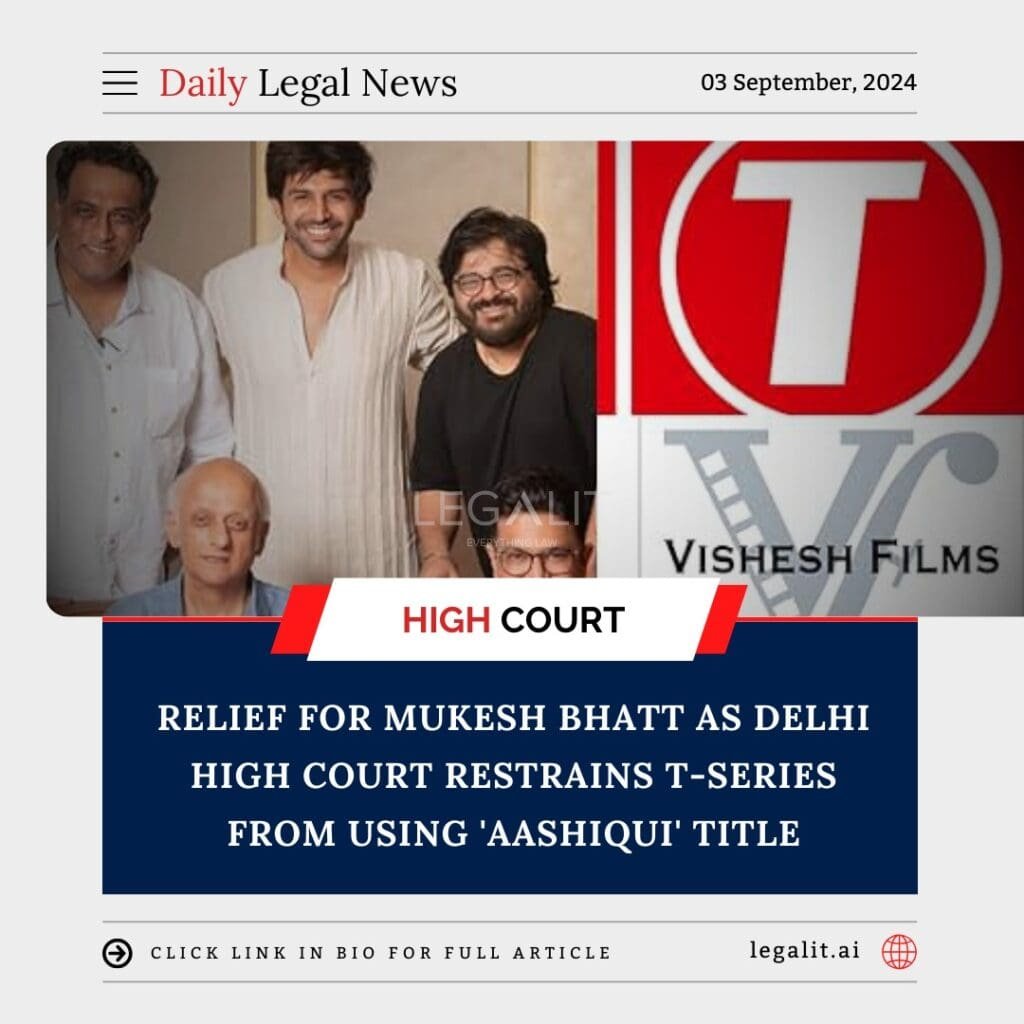
The Delhi High Court has granted relief to filmmaker Mukesh Bhatt by restraining T-Series from using the title “Aashiqui” for any new film or project. This interim order marks a significant development in a dispute over the rights to the iconic Bollywood film franchise, which has been a major commercial and cultural success since its inception in the early 1990s.
Background of the Dispute:
The “Aashiqui” franchise, comprising the original 1990 blockbuster Aashiqui and its successful sequel Aashiqui 2 in 2013, is a well-known brand in the Indian film industry. The original film was produced by Mukesh Bhatt under the banner of Vishesh Films, with music rights held by T-Series, which has also been involved in the production of subsequent films.
However, a legal dispute arose between Mukesh Bhatt and T-Series over the ownership and use of the “Aashiqui” title for future projects. Mukesh Bhatt filed a plea seeking to prevent T-Series from independently using the franchise name, arguing that it was an integral part of his brand, Vishesh Films, and could not be used without his consent.
Key Points of the Delhi High Court Order:
- Restraining Order Against T-Series: The Delhi High Court has issued an interim order restraining T-Series from using the title “Aashiqui” for any new films or other creative projects without prior approval from Mukesh Bhatt. The court acknowledged Mukesh Bhatt’s contention that the title is closely associated with his production house and that unauthorized use could cause confusion and dilute the brand value.
- Recognition of Trademark Rights: The court’s order is based on the recognition of Mukesh Bhatt’s claim that the title “Aashiqui” is a trademark owned by Vishesh Films. The judge noted that the use of the title by T-Series without the producer’s permission could mislead audiences and affect the goodwill built around the franchise over the years.
- Protection of Intellectual Property: By restraining T-Series, the court reinforced the importance of protecting intellectual property rights in the entertainment industry. The ruling highlighted that a title like “Aashiqui,” which has significant commercial value and brand recognition, cannot be exploited without proper authorization from the rightful owner.
- Interim Nature of the Order: The court clarified that the order is interim in nature, pending further proceedings to determine the final rights over the use of the “Aashiqui” title. Both parties are expected to present more detailed arguments and evidence in the next phase of the legal battle.
Mukesh Bhatt’s Arguments:
- Brand Value and Goodwill: Mukesh Bhatt, through his legal team, argued that the “Aashiqui” franchise is synonymous with Vishesh Films and that he has invested considerable creative effort and resources into building its brand value. He maintained that any unauthorized use of the title would directly infringe on his intellectual property rights and cause irreparable damage to his reputation and business interests.
- Precedent of Collaboration: Bhatt also pointed out that while T-Series had partnered with Vishesh Films in the production and distribution of the original films, any future use of the “Aashiqui” title should follow a similar collaborative model or receive explicit consent from him, as the original creator and producer.
T-Series’ Defense:
- Right to Use Title: T-Series, in its defense, argued that it held the music rights and had contributed significantly to the success of the “Aashiqui” films, thereby having an equitable right to use the title for future projects. The company asserted that its involvement in the production of the films granted it co-ownership over the title.
- Existing Agreements: T-Series claimed that existing agreements between the two parties provided for the use of the title in future projects, and that it had not violated any terms by planning to produce new content under the “Aashiqui” brand.
Broader Implications of the Order:
The Delhi High Court’s order has broader implications for intellectual property rights within the Indian entertainment industry. It underscores the need for clear agreements and understanding between co-producers and stakeholders about the ownership and use of film titles, characters, and other creative assets. This case highlights the complexities involved in co-productions and joint ventures, where multiple parties may claim rights to certain aspects of a film or franchise.
For Mukesh Bhatt, the interim relief is a significant victory that temporarily protects his creative interests and rights to the “Aashiqui” franchise. However, the final resolution of the dispute will depend on the court’s interpretation of the agreements and contracts between the parties and the evidence presented during the proceedings.
The entertainment industry will be closely watching the outcome of this case, as it could set a precedent for similar disputes over intellectual property rights, co-ownership, and creative control in the future.